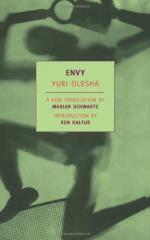|
This section contains 5,154 words (approx. 18 pages at 300 words per page) |

|
SOURCE: Tolczyk, Dariusz. “Poetics and Politics.” Partisan Review 59, no. 2 (spring 1992): 296-307.
In the following essay, Tolczyk calls Olesha a post-realist who found it nearly impossible to reconcile his idea of artistic “truth” with the realities of the Soviet system.
Russian literary criticism waits for its own The Captive Mind, in which the problem of various writers' attraction to communism, especially in the 1920s and 1930s, would be given as expansive study as Czeslaw Milosz's gave to Eastern European writers and Stalinist dogmas. Yet does the problem of a writer's attraction to communism still pertain to literary criticism? Can it be described in literary terms, or is its only literary context in the fact that we are aware of the political choices of writers? At least in some cases, there does exist a crucial connection between the parameters of literary expression assumed by a writer and his ideological options...
|
This section contains 5,154 words (approx. 18 pages at 300 words per page) |

|


